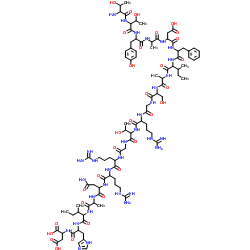Inhibitory effect of TNF-alpha on the intestinal absorption of galactose.
P Amador, J García-Herrera, M C Marca, J de la Osada, S Acín, M A Navarro, M T Salvador, M P Lostao, M J Rodríguez-Yoldi
Index: J. Cell. Biochem. 101(1) , 99-111, (2007)
Full Text: HTML
Abstract
Sepsis is a systemic response to infection in which toxins, such as bacterial lipopolysaccharide (LPS), stimulate the production of inflammatory mediators like the cytokine tumor necrosis factor alpha (TNF-alpha). Previous studies from our laboratory have revealed that LPS inhibits the intestinal absorption of L-leucine and D-fructose in rabbit when it was intravenously administered, and that TNF-alpha seems to mediate this effect on amino acid absorption. To extend this work, the present study was designed to evaluate the possible effect of TNF-alpha on D-galactose intestinal absorption, identify the intracellular mechanisms involved and establish whether this cytokine mediates possible LPS effects. Our findings indicate that TNF-alpha decreases D-galactose absorption both in rabbit intestinal tissue preparations and brush-border membrane vesicles. Western blot analysis revealed reduced amounts of the Na+/glucose cotransporter (SGLT1) protein in the plasma membrane attributable to the cytokine. On the contrary, TNF-alpha increased SGLT1 mRNA levels. Specific inhibitors of the secondary messengers PKC, PKA, the MAP kinases p38 MAP, JNK, MEK1/2 as well as the proteasome, diminished the TNF-alpha-evoked inhibitory effect. LPS inhibition of the uptake of the sugar was blocked by a TNF-alpha antagonist. In conclusion, TNF-alpha inhibits D-galactose intestinal absorption by decreasing the number of SGLT1 molecules at the enterocyte plasma membrane through a mechanism in which several protein-like kinases are involved.(c) 2006 Wiley-Liss, Inc.
Related Compounds
| Structure | Name/CAS No. | Molecular Formula | Articles |
|---|---|---|---|
 |
PKI (5-24)
CAS:99534-03-9 |
C94H148N32O31 |
|
A potent synthetic peptide inhibitor of the cAMP-dependent p...
1986-01-25 [J. Biol. Chem. 261 , 989, (1986)] |
|
Effects of endoplasmic reticulum stress on group VIA phospho...
2010-10-29 [J. Thorac. Cardiovasc. Surg. 285 , 33843-57, (2010)] |
|
Release of Ca2+ by inositol 1,4,5-trisphosphate in platelet ...
1989-02-01 [Biochem. J. 257(3) , 715-21, (1989)] |
|
Luteinizing hormone (LH) acts through PKA and PKC to modulat...
2011-03-01 [Cell Calcium 49(3) , 191-9, (2011)] |
|
Induction of a cytoplasmic activator of DNA synthesis in lym...
1990-12-01 [Cell Regul. 1(13) , 1015-25, (1990)] |